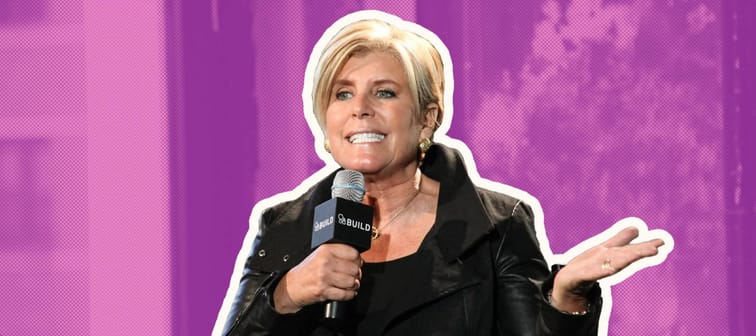1. Don't miss your student loan payments
Struggling with student loan debt? Whatever you do, don't just throw up your hands and stop paying.
Even though student loan payments are paused and some debt has been forgiven, Orman said "start paying your student loans right now".
In an August podcast episode, Orman recommended prioritizing your student loan payments now while the freeze is still active.
"Since we know the pause is going to end, why not start making payments on your student loan right here and right now at that 0% rate? Because the more you pay at 0%, the more your student loan will decrease."
"Make paying back your student loan the very first bill you pay," Orman says on her Facebook page. "It is more important that you make your student loan payments on time each month than any other bill."
She has called student loan debt "the most dangerous debt you can ever have" because you can't erase it through bankruptcy.
In a March 2023 podcast, Orman said "So this kind of debt currently follows you all the way into old age."
Kiss Your Credit Card Debt Goodbye
Having a single loan to pay off makes it easier to manage your payments, and you can often get a better interest rate than what you might be paying on credit cards and car loans.
Fiona is an online marketplace offering personalized loan options based on your unique financial situation.
When you consolidate your debt with a personal loan, you can roll your payments into one monthly installment. Find a lower interest rate and pay down your debt faster today.
Get Started2. Don't ever co-sign a loan
When a friend or family member in need asks you to co-sign a loan, Orman says the only correct response is to turn them down.
As she puts it: "Don’t be afraid to say 'no to others and say 'yes' to yourself."
When you co-sign a loan, you become legally responsible for paying back the money. Life is unpredictable, and if anything happens to prevent the borrower from repaying the loan, you’ll be on the hook to make the payments.
Plus, if the borrower is so much as late on a few payments, your credit score could take a hit.
3. Don't let debt linger
"Debt is bondage,” Orman once told CNBC. "You will never, ever, ever have financial freedom if you have debt."
She warns that big problems can happen when you have to reach for your credit cards to cover unexpected expenses.
The average credit card interest rate stands at 22.9%, so the longer you put off paying down your credit balances, the more money you lose, and you can easily wind up paying for your purchases three or four times over.
And interest rates on all types of loans are likely to continue to rise this year.
Read more: * Americans are paying nearly 40% more on home insurance compared to 12 years ago — here's how to spend less on peace of mind
Stop overpaying for home insurance
Home insurance is an essential expense – one that can often be pricey. You can lower your monthly recurring expenses by finding a more economical alternative for home insurance.
SmartFinancial can help you do just that. SmartFinancial’s online marketplace of vetted home insurance providers allows you to quickly shop around for rates from the country’s top insurance companies, and ensure you’re paying the lowest price possible for your home insurance.
Explore better rates4. Don’t ever take out a payday loan
If you want to get a rise out of Suze Orman, just ask how she feels about payday loans.
“I am begging all of you, do not take a payday loan out,” she said on one episode of her podcast, going so far as to add that it’s the biggest mistake listeners could ever make.
Payday loans are tempting because they’re relatively easy to get when you’re strapped for cash. However, they’re offensively expensive. The typical annual percentage rate is 400%. By comparison, the average APR on credit cards is currently around 20%.
Several states have capped the APR on payday loans at 36% or have even banned the loans altogether.
5. Don’t retire owing money on your home
A survey from mortgage banker American Financing found that 44% of Americans in their 60s and 70s are still paying off a mortgage. And 17% said they don’t expect to ever pay it off.
Orman urges people to go into retirement mortgage-free, for two reasons: to stretch their retirement savings, and to rid themselves of debt — an albatross that affects even mental health.
“If you’re going to stay living in that house for the rest of your life, pay off that mortgage as soon as you possibly can,” Orman told CNBC in 2018.
But don't tap your 401K to make monthly payments or pay off your mortgage — or any other debt for that matter.
In a 2022 interview with Moneywise, Orman warned that using the money in that account "for anything other than retirement" can leave you financially vulnerable once you stop bringing in a paycheck.
Sponsored
Follow These Steps if you Want to Retire Early
Secure your financial future with a tailored plan to maximize investments, navigate taxes, and retire comfortably.
Zoe Financial is an online platform that can match you with a network of vetted fiduciary advisors who are evaluated based on their credentials, education, experience, and pricing. The best part? - there is no fee to find an advisor.







